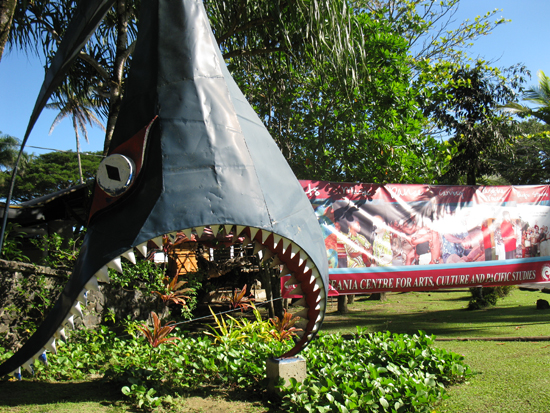
By Dr Sky Marsen
COMMENTARY: Participants had a genuine interest in improving the state of the environment in the Pacific and the lives of the diverse people living in it at the week-long 12th Pacific Science Inter-Congress that has just ended in Fiji.
The event hosted at the regional University of the South Pacific attracted people with a personal commitment to social change, making it more than an academic conference.
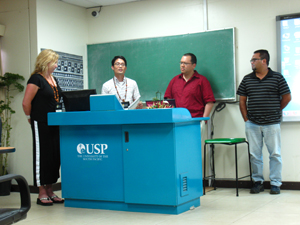 As an emotional Professor Vilsoni Hereniko, the Fiji playwright, filmmaker and academic, aptly remarked, the conference had a “soul”.
As an emotional Professor Vilsoni Hereniko, the Fiji playwright, filmmaker and academic, aptly remarked, the conference had a “soul”.
Now back at the University of Hawai’i after being director of USP’s Oceania Centre for Arts, Culture and Pacific Studies for two years, Dr Hereniko praised the conference organisers for including the arts in the conference.
Indeed the programme offered a balanced spread of topics, with sessions ranging from biodiversity and climate change to information technology and culture and gender.
The parallel symposium,Ocean and nations: Failed States and the environment in the Pacific, brought together a dynamic collection of presentations looking at the Pacific condition from different angles.
The keynote by literary theorist Dr John O’Carroll focused on perceptions of the notion of “island”.
Cultural anxieties
Dr O’Carroll discussed ways in which constructions of the island in literature and film reflect cultural anxieties and desires. He drew attention to the importance of literature, and especially the novel, in shaping beliefs and values.
Examples were taken from various texts including The Life of Pi, Lord of the Flies and Floating Island.
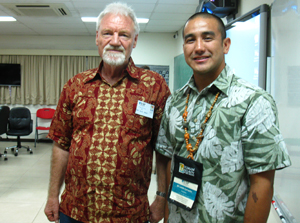 Professor David Robie, director of AUT University’s Pacific Media Centre, put the focus on the media’s role in raising public awareness of environmental issues.
Professor David Robie, director of AUT University’s Pacific Media Centre, put the focus on the media’s role in raising public awareness of environmental issues.
He described how environmental journalism has tested the media’s founding principles of objectivity and impartiality all over the world. He noted that the situation is especially critical in the Pacific because of geographical vulnerability and noted the need for more priority to be given to the environment by the media.
The talk was accompanied by an impressive visual presentation with images of cataclysmic events from a variety of media texts, such as film.
From a historical perspective, Micronesian scholar Lisa Linda Natividad explored the role of US militarisation in “unincorporated territories” Guam and the Marshall Islands.
She argued that in many ways the situation could be seen as neo-colonial, a view that was shared by her compatriot Guam attorney Leevin Camacho in his talk on US militarisation and indigenous communities.
Deplorable health
Natividad’s talk, with its depiction of the deplorable health situation in the region following nuclear testing stressed the urgent need for a better understanding of local history and policy.
Other sessions in the congress looked at the Pacific in terms of environment, language, technology and community.
Computer scientist Dr Rohitash Chandra described the role that open source software can play in the development of Pacific states, and urged for more widespread adoption of this software.
He explored uses of open source programmes in health, government and education sectors.
Linguist Dr Paul Geraghty delighted the audience with a lively description of the etymologies of place names in the Pacific. It was interesting to learn that many seemingly different places and words actually have common roots.
For example, “Fiji” comes from the Fijian word for “east” or “sunrise” – “viti” – which is also found in modified form in “hiti” in the place name “Tahiti”.
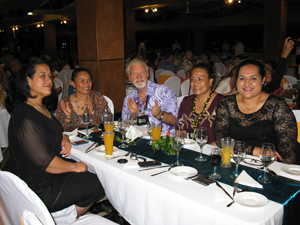 AUT delegation
AUT delegation
Also, social science master’s student from AUT University Edmond Fehoko described how kava ceremonies in Auckland help to tighten the male Tongan community and sustain cultural values.
Fehoko attended with a delegation of his colleagues, all wearing AUT paraphernalia in an impressive gesture of “esprit de corps” and Pacific solidarity.
The opening ceremony pleased the “tourists” with a traditional Fijian ceremony. USP Vice-Chancellor Rajesh Chandra introduced the conference, by emphasising that both USP and the Pacific region have strategic importance in environmental research.
The USP has a new five-year ambitious strategic plan, which envisions the university as a major player in Pacific research.
The second speech was given by the president of the Pacific Science Association, Professor Nancy Lewis, who described the Asia-Pacific region as the most dynamic in the world, but also one that faces the most challenges in environment and society.
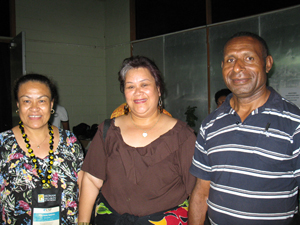 Professor Lewis urged decision makers in the region to balance ambition with realism and noted that the issues raised in the conference are “exciting, broad and interdisciplinary”.
Professor Lewis urged decision makers in the region to balance ambition with realism and noted that the issues raised in the conference are “exciting, broad and interdisciplinary”.
The final opening speech was delivered by the president of Fiji, Ratu Epeli Nailatikau, who praised the work of scientists. He noted that science produces both tangible results – his main example was HIV breakthroughs, as he is the UN Special Representative for the Pacific - and changing perceptions.
Interestingly, he gave evolutionary science as an example of the latter, which is a commendable move by the President of a near-fundamentalist country.
Dr Sky Marsen is an author and senior lecturer in communication studies at the University of the South Pacific. She offers a personal reflection on the conference.



